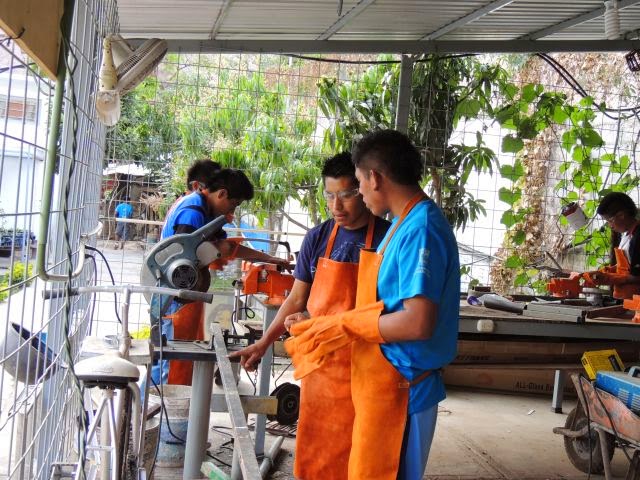Just over one year ago twenty-year-old Alex Graf was
studying welding at Medicine Hat College—and, then, on February 11, 2014, he
was killed in a motor vehicle accident. Today, just one year later, dozens of
young men from the impoverished mountains of Mexico are benefiting from the
generosity of family and friends inspired by the “one of a kind personality”
and the “love and laughter” of Alex Graf. As the years go by, those “dozens”
will become “hundreds.”
 |
| Alex's Welding Shop |
“Alex’s Welding Shop” is now one of the favorite places for
students at the Champagnat High School of the Mountain to “hang out”—as long as
they’re doing something constructive and as long as they are observing all the
rules in terms of safety and care of the machinery.
 |
| Many of the students never saw welding tools before in their lives |
I love hanging out in the shop too—even as I confess that
I’m seldom doing something constructive. But just watching the students
interact and learn is a beautiful experience.
 |
| It's always easier working with someone else |
The education offered at this school is incredible. The 245 indigenous
students “follow” the regular Mexican curriculum, but they learn about their
native cultures as well: the sacred stories, the customs, the rituals, the
traditions, and the struggles that have nourished the cosmovision of their
peoples for centuries.
 |
| "Now what did the teacher say this was for?" seemed to be a common reaction in the beginning |
In his latest book, Change
the Story, Change the Future: A Living Economy for a Living Earth, David
Korten points out that “we humans live by our shared framing stories and have a
deep need for a sense of purpose and meaning. If we do not share an authentic
sacred story, the void will be filled with an inauthentic story—and that is our
problem. An economy, a society, built on the foundation of a lie cannot work.”
 |
| "It looks like the right length to me" |
Korten also mentions that “many indigenous people use the
term sacred to refer to what is most
important, most essential to the well-being of the community and its members,
and therefore most worthy of special respect and care. It is in that sense that
I speak here of sacred stories.”
 |
| "Wow, this is fun..." |
Talking to the students in Alex’s Welding Shop proves that
the “sacred story” motivating these students is one of what is “most essential
to the well-being of the community and its members.” The students don’t talk
about making money or getting ahead just on a personal level; they constantly
refer to the difference that their learned skills can make in their school now
and in their communities of origin afterwards.
 |
| There is classroom learning too for welding—here with Brother Checo, master welder |
It was almost funny to be present in the first “hands-on”
classes. Master welder Andrés invited the students to make something small: a
table, a flowerpot holder, a window frame, a small chair—one student even made a
barbell for weight lifting. He let them make tons of mistakes—and some of the
finished products did produce laughter (including a table with the most uneven
legs I’ve ever seen). But then, building on that initial effort, Andrés slowly
and surely guided the students through the construction of the same item—this
time using the tools and methods that an experienced welder would take
advantage of in order to produce a high-quality product.
 |
| "I think this will work; all I need is the other end" |
Alex Graf’s legacy is impacting lives in this remote
mountain region of Mexico. “Changing the table” is not only “changing the
story” for students and families and communities here; it is in a very real way
“changing the future.” The students asked me to extend their gratitude to
Alex’s family and friends and to Mission Mexico for helping them to have this
life-giving experience. Alex is now part of their “sacred story.” I can’t think
of a more incredible tribute. Thank you, Alex.
No comments:
Post a Comment